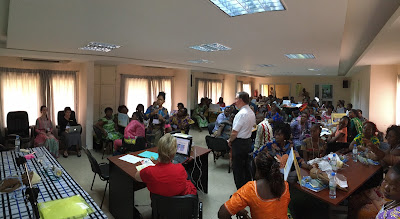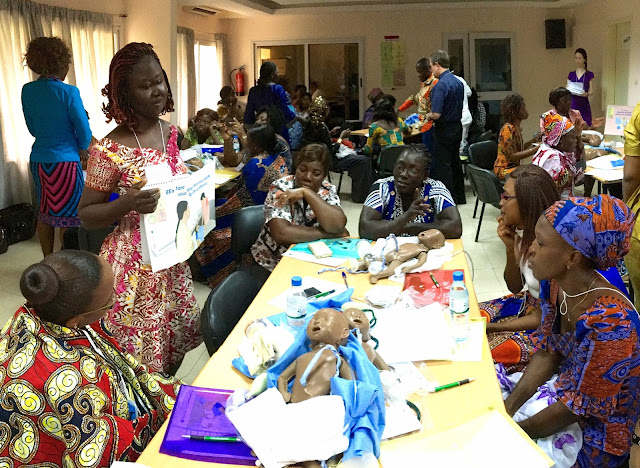| ||||||||||||||||||||||||||||||
PLEASE LOGIN USING THE INFORMATION ABOVE TO ACCEPT/REJECT THE INVITE AND TO DOWNLOAD PLANS | ||||||||||||||||||||||||||||||
Togo Doc
Tuesday, July 22, 2025
Proposal from Steve Grover Now Available for Review
Friday, July 15, 2016
Helping Mothers Survive in Togo
Today our LDS Humanitarian Services team taught Helping Mothers Survive to over a hundred midwives and doctors in 2 groups here in Atakpamé, Togo. We used the mannequins to test the participants on their response to maternal hemorrhage. The mannequins have a reservoir that can be filled with water which we can dye red to simulate blood. Then the person wearing the "MamaNatalie" apparatus (see: https://www.youtube.com/watch?v=5EgPIcIus4o) can adjust the amount of bleeding based on how the provider responds to the emergency. We drilled them over and over again. I think they will now be more prepared to respond to OB emergencies!
Thursday, July 14, 2016
Helping Babies Breathe-Day 4; HBB Closing Ceremonies and Equipment Distribution


We completed the HBB training today with the 2nd group. At the end of the course we had a closing ceremony. One of the doctors from Togo’s Ministry of Health attended and spoke. I was invited to speak as well, since I am designated the medical director of these courses. I thanked the participants for their hard work and thanked the Ministry of Health, the Pediatric Society and UNICEF for their support. I told them that each participant would be receiving a bag and mask, stethoscope, suction bulb, a CD with all of the course materials and a printout of all the course materials.
Then each facility will receive a bag with a teaching kit which includes the same materials as well as the resuscitation manequin, the flipchart, and about 25 manuals.
I explained that these materials are purchased with money from the Humanitarian Fund of the Church of Jesus Christ of Latter-day Saints. Individual members of the Church throughout the world, donate to this fund because of our belief that each of us is a child of God and that, as the Lord taught, we should love one another. For that reason, we want to help the mothers and babies of Togo and other developing countries through Helping Babies Breathe and Helping Mothers Survive.
Wednesday, July 13, 2016
Helping Babies Breathe-Day 3
Today we began teaching HBB to our second group of midwives. They work in hospitals of various sizes all around Togo.
They did a great job learning to ventilate a baby who is having problems breathing after birth. Many said that they do not have bag and mask resuscitators at their hospitals, so it will be nice for them to receive this equipment.
As part of the training, participants are asked to practice teaching with the flipchart. On the back of the flipchart are the corresponding main points that correspond with each image. They did very well teaching each other.
Tuesday, July 12, 2016
Helping Babies Breathe-Day 2; Preparing the Equipment
 Today we taught the second day of our first 2-day HBB course here in Atakpamé. We had about 50 participants from 46 different hospitals. The midwives did great! Many of them work in small health centers where they work alone with one nurse. The midwives are on call 24/7/365. They live at the small hospital. What dedication!
Today we taught the second day of our first 2-day HBB course here in Atakpamé. We had about 50 participants from 46 different hospitals. The midwives did great! Many of them work in small health centers where they work alone with one nurse. The midwives are on call 24/7/365. They live at the small hospital. What dedication!
After the course, we prepared the teaching kits and resuscitation equipment that LDS Humanitarian Services will be donating. They will receive this equipment later this week.
Monday, July 11, 2016
Teaching Helping Babies Breathe in Atakpamé-Day 1
 Today we taught Helping Babies Breathe to about 50 midwives who are from the Plateaux and Maritime regions of Togo. The local instructors we trained in Lomé did great!
Today we taught Helping Babies Breathe to about 50 midwives who are from the Plateaux and Maritime regions of Togo. The local instructors we trained in Lomé did great!Most said that they do not have a bag and mask available in their hospitals yet. So the bag and mask kits that will be given to them at the end of the course will go to good use. The neonatal resuscitation equipment has been purchased by funds donated to the Humanitarian Fund by members and friends of the Church of Jesus Christ of Latter-day Saints.
Prior to the beginning of the course our Team Leader and I attended the Opening Ceremonies. There were representatives of UNICEF, the Pediatric Society of Togo, and the Regional and National Health Ministries. Except for mine, the speeches were quite formal! The UNICEF representative said that infant mortality in Togo is now about 27 per 1000 (or just under 3% of births). Maternal mortality is 401 per 100,000 women giving birth.
The press was there, and I was interviewed for Togo TV.
Sunday, July 10, 2016
The Sabbath in Lomé
 Today we attended Church in Lomé. There are 16 congregations in the Lomé area, but only one chapel. Three of the congregations meet there and the other wards and branches meet in rented facilities around the city. Missionaries will be sent to Kpalime in the next few weeks. This will be the first area outside of the capital where missionaries will labor.
Today we attended Church in Lomé. There are 16 congregations in the Lomé area, but only one chapel. Three of the congregations meet there and the other wards and branches meet in rented facilities around the city. Missionaries will be sent to Kpalime in the next few weeks. This will be the first area outside of the capital where missionaries will labor.The chapel in Lomé is beautiful. It was built in 2011. It was a wonderful to worship with the saints in Lomé.
Our opening hymn was "How Firm a Foundation."
I love the words of the second verse both in French and in English:
- «Pendant l’abondance ou dans la pauvreté,Aux jours de souffrance ou bien dans la santé.Sur terre ou sur mer, au foyer, au désert,As-tu besoin d’aide, as-tu besoin d’aide,As-tu besoin d’aide, mon bras t’est offert.»
Subscribe to:
Comments (Atom)



















